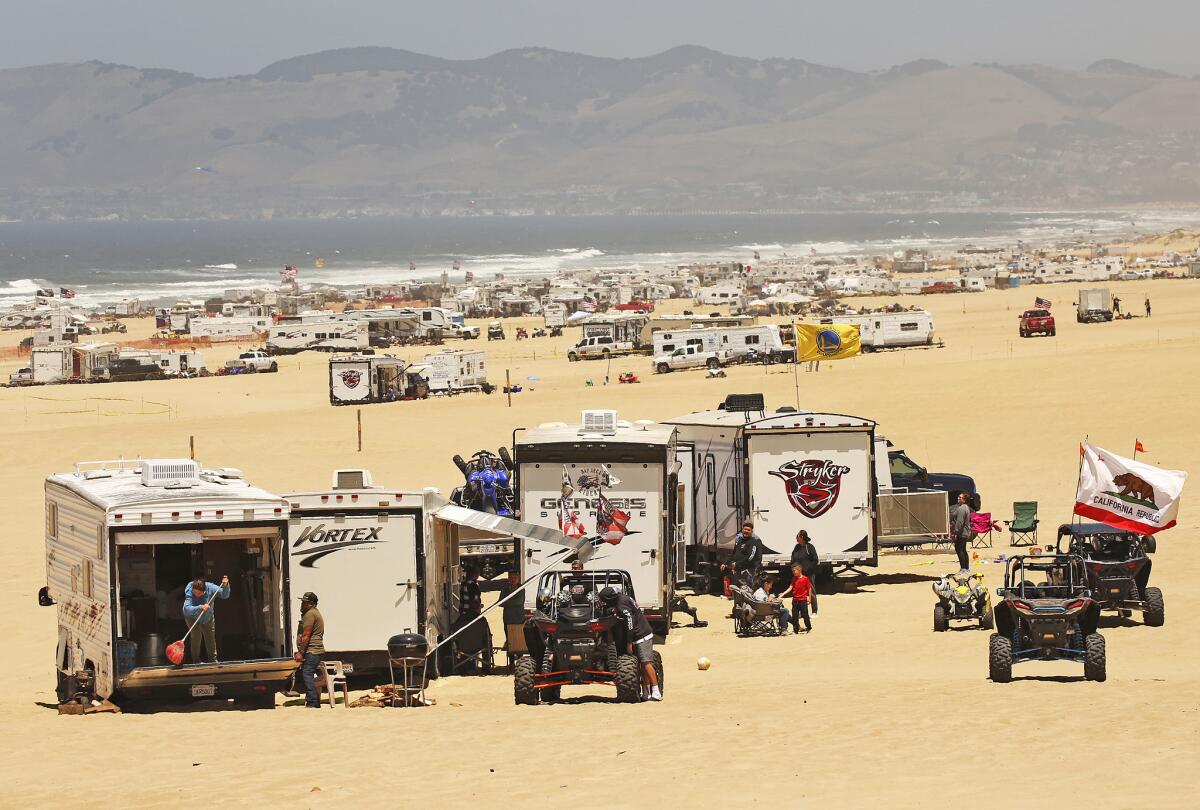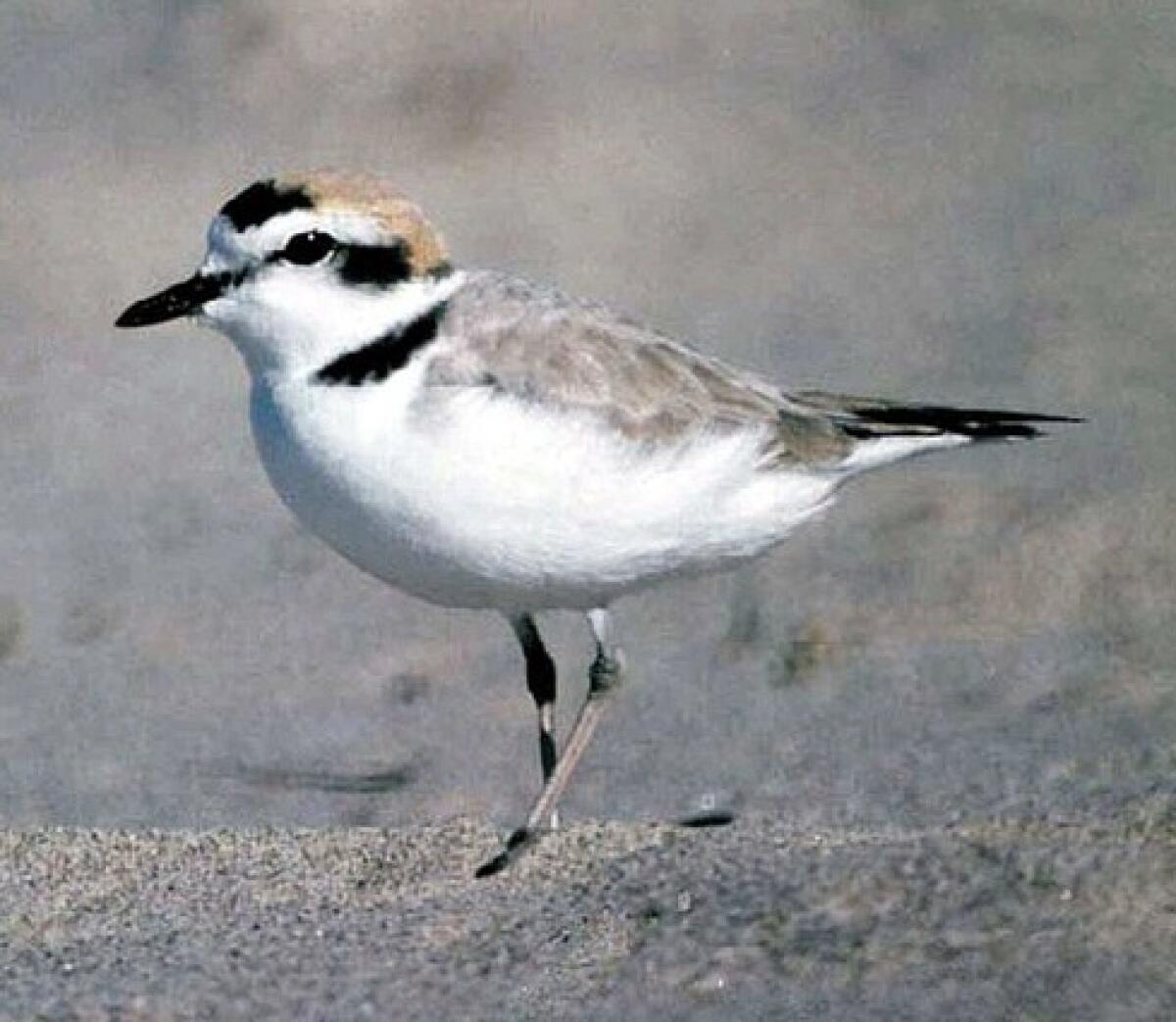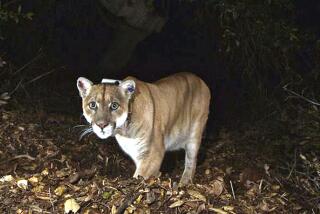Column: On this California beach, snowy plovers and dune buggies are in a fight for survival

OCEANO, Calif. — What I’m about to tell you is not fake news. But you may need to read it twice to believe your eyes.
State Department of Parks and Recreation rangers have purposely destroyed the nests of threatened shorebirds here to clear an environmentally sensitive stretch of beach and dunes for off-road vehicle enthusiasts, who turn out by the thousands, including one group that calls itself the Jerk Pirates.
So you’re thinking maybe we’re not in California anymore, right?
Wrong. We are in San Luis Obispo County, just south of Pismo Beach, home to a decades-long tradition of sand buggies carving up the magnificent dunes and RVs driving onto the glorious beach.

But as my mate Louis Sahagun reported two weeks ago, the war between off-roaders and environmentalists has escalated on California’s Central Coast, ever since the popular off-road site was shut down a few months ago because of COVID-19 with no date yet set for its reopening.
That was bad news for the Jerk Pirates but good news for snowy plovers, who expanded their nesting area when the dune buggies left, or at least they did until park rangers began big-footing Mother Nature. California Coastal Commission officials flew into a frenzy and ordered state parks officials to stop brushing away plover nests, relocating birds, and installing stakes and flags to discourage breeding.
“The Coastal Act protects sensitive habitats including beach areas that endangered species depend on for their survival,” said Coastal Commission director Jack Ainsworth.
But the Coastal Commission bears some responsibility here too. Back in 1982, it was the commission that gave the parks department a permit to operate California’s only designated off-road vehicle park at Oceano Dunes. The coastal agency has lived to regret that decision and wants to gradually phase out off-roading, but even as state and federal agencies are trying to work out an agreement, environmentalists and off-roaders are digging in deeper .
Last week, I was greeted by passionate, sign-waving conservationists when I arrived at the beach in Oceano on a sun-splashed, breezy day. They pointed out the families lugging coolers, chairs and umbrellas down to the water’s edge and said you don’t see such a scene in normal times, because when off-roaders are allowed the beach becomes a dangerous highway, scaring off those interested in a mellower experience.
“It’s like the Wild West,” said Bonnie Ernst, despite claims to the contrary by off-roaders, who say theirs is a warm and friendly family-oriented tradition.
The enviros told me the vehicles and their drivers stay on the beach for days at a time, plowing through the surf and dunes well into the night and leaving mounds of trash and broken bottles behind.
Air quality is so bad from churned-up sand and silica, they said, it’s a serious health hazard in the largely low-income agricultural areas near the shore.
Last year, according to news reports, six people died in off-roading accidents on the beach.
No wonder the plovers have been avoiding the area.
Former San Luis Obispo County Supervisor Evelyn Delaney handed me a copy of her recent testimony before the Coastal Commission, in which she offered her take on the situation.
“The crowd that uses the dunes is a bunch of bullies…. They drive around in big pickups, flying Confederate flags, gunning their engines. They don’t follow any rules. They are daredevils in the dunes.”
So how could this be, here in a state that has made coastal conservation a civic duty and moral imperative?
Some argue that the tradition, which began in Pismo Beach many decades ago, is immensely popular, drawing 2 million visitors a year, pumping tens of millions of dollars into the local economy and benefiting state parks through fees for beach use.
Well, excuse me, but we’re talking about a natural wonder, a treasure, and a fragile piece of a larger ecosystem that is under attack by human disruption and the current reckless dismantling of environmental protection at the federal level.
Every bird, every insect and every clam matters. The temporary benefits of gas-powered playthings are not worth the lasting loss to the universe.
But it’s not just the parks department that doesn’t seem to get it. Talk about having to read something twice, I couldn’t believe the comment in Sahagun’s story by a spokeswoman for the U.S. Fish and Wildlife Service.
“While we are excited to see plovers stretching their legs to build nests in new locations,” she said, “these new areas are unfavorable because they are designated for vehicular recreation when open to the public.”
With friends like that in the U.S. government, fish and wildlife need no enemies. If those new areas are so “unfavorable,” why not just bring the off-roaders back and let them plow through the nests? Or why not hand out shotguns and turn the dunes into a game hunting preserve?
A small part of me, very small, says that in a state where the rich have cordoned off access to the beach and views of the beach, an off-road beach zone is one way to break that grip. But park the rigs on the pavement, enjoy the beach by skimboard or boogie board, and let the dunes be sculpted by nature rather than by churning wheels.
When I reached out to state parks administrators for comment, they didn’t respond. Instead, they handed me off to their boss, Mark Gold, executive director of the state’s Ocean Protection Council. Gold’s credentials as a conservationist and marine biologist are unimpeachable, but he admitted he finds himself wedged into a tight spot on this issue, and said he had just gotten off the phone with 25 state and federal officials trying to figure out how to proceed.
Gold said messing with the plover nests “should never have happened.” The birds, he said, were just doing what they did naturally for hundreds if not thousands of years before humans got in the way. The plover nesting season runs from March to September, Gold said, and the state is trying to protect nesting activity through that period.
And then what?
That’s unclear, Gold said, and it’s complicated. If an off-road vehicle park were proposed today, it would never happen, Gold said.
But the state hopes by the end of the year to have a plan that takes conflicting desires and goals into account. And what might such a plan look like?
“It remains to be seen,” Gold said.
Well good luck with that, because just as the environmentalists have drawn a line in the sand, so too have the off-roaders, who say they’ve made many concessions and seen their designated park area shrink over the years.
This quote from one of the off-roaders makes clear that compromise is not on the agenda: “We’re the endangered species here,” said Danny Hensley, 51, who said he’s been off-roading on the beach since he was a mere lad.
He and his wife, Lea, live in Oceano and have a company that sells ropes used for hauling stuck vehicles out of the sand. Danny said that’s where the name Jerk Pirates, a social group now 6,000 strong, came from.
Danny acknowledges that he has seen a few Confederate flags on the beach, but also Mexican flags, gay pride flags, and people of every sort.
“You see every religion, every nationality, gay, straight, transgender — everybody, and everybody gets along,” said Lea, who told me that if she had to pick between vacationing in Hawaii or Oceano, she’s going with the dunes.
She and her husband said the charges about trash, bad air quality and general mayhem on the beach are all lies, though others dispute that.
And they invited me to spend a few nights on the beach to see for myself what it’s like out there, if the off-roaders are ever allowed back.
Me, an honorary Jerk Pirate? I don’t quite get the thrill of it, nor would I look forward to digging sand out of every orifice. But I accepted the invitation, and will let you know how that goes — if it goes.
I made it clear to the Hensleys, though, that I don’t think recreational vehicles should be allowed anywhere near an 1,100-mile coast that is one of the world’s great marine habitats, and shame on the state if it doesn’t shut down the destruction derby for good.
In this fight, I’m for the birds.
More to Read
Sign up for Essential California
The most important California stories and recommendations in your inbox every morning.
You may occasionally receive promotional content from the Los Angeles Times.











